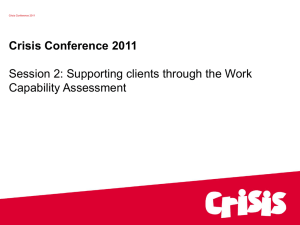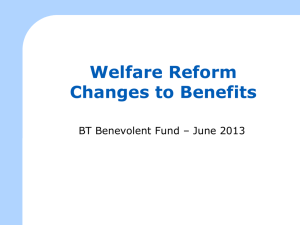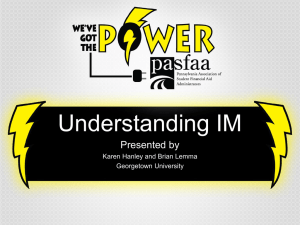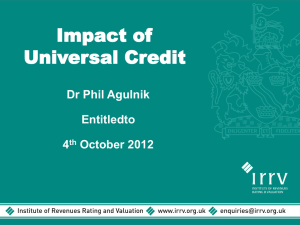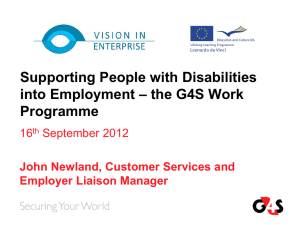Carers-Training-20122
advertisement
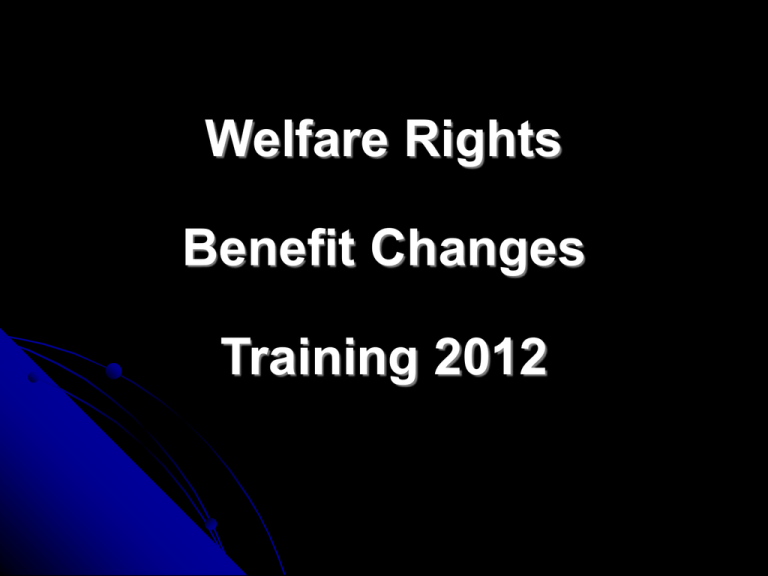
Welfare Rights Benefit Changes Training 2012 January 2012 Local Housing Allowance (LHA) restrictions for under 25's extended to under 35's in Private rented tenancies. Previously, LHA for single childless people under 25 was restricted to the rent level of a bedsit (or shared accommodation) rate about £60 weekly. This restriction is now extended to include those under 35 who previously were allowed the one bedroom LHA rate about £80 weekly so a loss of about £20 weekly. Always ask for the Council for a Discretionary Hardship Payment (DHP) to top up any shortfall in your benefit New claims from 1 Jan 2012 will have the lower shared rate applied straight away. For those already claiming LHA on 1 Jan 2012 the restriction will be applied after that date, this is starting to happen now. For example, - For those who claimed before April 2011 - the restriction will apply 9 months after the anniversary of their claim For those who claimed after 1 April 2011 but before 1 Jan 2012the restriction will apply from the anniversary date of their claim. This transitional protection may end earlier or the rate may change if there are certain changes in circumstances. April 2012 Tax Credits The 'protection' of the family element (£10+) from reduction is removed, as a guide one child income needs to be under £26K, two children under £32K, higher amounts are used if disabled or child care ect. It obviously means that a lot less people will now get Child Tax Credits. The extra £4 a week Child Tax Credit for each child aged one and two promised for 2012 by the last Government will not go ahead. A way to claiming Working Tax Credit (WTC) is by those aged 50 or over, who are starting work after being on certain Benefits for six months. This route to WTC is abolished. But it does not stop the over 50’s getting WTC for other reasons E.g working over 30+ hours or aged over 60 The couple rule: The minimum hours that a couple with children must work has increased from 16 to 24 hours a week, with at least one working 16 hours. The impact could be an immediate loss of up to £74 a week (over £3,000 a year) for a working family earning £7,000 a year. But there are exceptions to this 24 hour rule, for example where someone is incapable of work, on DLA or entitled to Carers Allowance. Backdating: The backdating of claims reduces from 3 to 1 month. This also applies to backdating increases of existing awards for changes in circumstances, so it is important to stay on Tax Credits even if no money is paid. Changes in Income: Falls in annual income of up to £2,500 will be ignored. This new rule means that Tax Credits will not be increased until annual income has dropped below £2,500. Incapacity Benefit (IB) Most people getting Incapacity Benefit, Severe Disablement Allowance and 'Incapacity related' Income Support will be reassessed under the Employment and Support Allowance (ESA) medical test. A very difficult medical test to pass? If they pass the test they will go onto Employment and Support Allowance. If they fail it, they will have to: claim Jobseekers Allowance find work, or find another reason for remaining on Income Support like being a carer or a lone parent with a child under 5 appeal the decision (Possibly staying on the basic £71 weekly) or do without anything If the claimant passes the medical and their previous Incapacity related Benefit was higher? Employment and Support Allowance is topped up with an extra amount which is then frozen until "normal" Employment and Support Allowance rates catch up. Timescale: The national roll out started from 28 February 2011 and has been running at full capacity from May 2011. About 11,000 claims a week nationally are being reassessed. People who reach state pension age by April 2014 will not be reassessed. Incapacity Benefit and Income Support claimants started being reassessed from February 2011 onwards. People only getting Severe Disablement Allowance will not be reassessed until all the Incapacity Benefit and Income Support reassessments have been completed. Reassessments are planned to finish by the end of March 2014. From 31 January 2011 it has not been possible to make a "linked claim" (8 weeks or within two year of starting work) for Incapacity Benefits. Claims that would have previously been linked will be treated as new Employment and Support Allowance claims. How will they transfer over? People will get a letter and a phone call to tell them they are going to be reassessed under the ESA test. People do not have to fill in a claim form but most people will get an ESA50 medical questionnaire form to fill in and return and most will be asked to attend a medical at a local Jobcentre. People will carry on getting their Incapacity related Benefits while being assessed. After they have been reassessed they will get a phone call from Jobcentre Plus to tell them if they will transfer to ESA and what they can do if not. People who fail the ESA test will probably be asked during the call if they want to claim Jobseekers Allowance or appeal. They do not have to make a decision then. Everyone will then get a letter from Jobcentre Plus confirming the decision. People who pass the ESA test will start getting paid it between two and four weeks after the decision date. People who fail the ESA test will have their Incapacity Benefit stopped two to four weeks after the decision date. Results DWP estimate that about 23% of people reassessed will be found fit for work. Out of those, they estimate that: 50% will move onto Jobseekers Allowance 20% will move onto another Benefit (for example, Income Support, Carers Allowance or if possible re-claim Employment and Support Allowance) 30% will move off Benefit, for example, into work Terminally ill people should not have to complete an ESA50 or go to a medical as long as they provide a DS1500 report from their doctor as evidence they are terminally ill. If they have already sent a DS1500 for their Incapacity Benefit or Disability Living Allowance claim they should not have to provide another. They should automatically be transferred to ESA with a support component. People with severe illnesses and disabilities may not have to complete an ESA50 or go to a medical. It will depend on whether there is already enough evidence for a decision maker to decide they pass the ESA test. If so they will go onto ESA with a support component. They may be asked to fill in a shorter form called an ESA50a to check if they are unfit for work related activity. People who are at this time exempt from being assessed for their Incapacity Benefit will still have to go through the ESA reassessment process. Pension age by April 2014? People who reach state pension age by 6 April 2014 will not be reassessed. They will stay on their Incapacity Benefit until they reach pension age. For men this means 65. Women born up to and including 5 April 1952 will reach pension age on 6 March 2014 and will not be transferred. Women born on any date after 5 April 1952 will not reach pension age until 6 May 2014 at the earliest and will therefore go through the ESA transfer process. Challenging a reassessment decision People can appeal against a reassessment decision. Their old Benefit will stop and they can choose whether to: Get the basic 'assessment phase' Employment and Support Allowance rate pending the appeal. They do not have to make a claim but they must make a valid appeal in writing before they can be paid and submit medical evidence that they are sick. Or Claim Income Support (Only if they satisfy the rules on another ground) no disability premium will be paid for sickness or Jobseekers Allowance if they satisfy the rules. Claiming Jobseekers Allowance pending the appeal does not affect the later ESA appeal decision. Important. A person's "old" Incapacity related Benefit will stop between 2 and 4 weeks after the decision. If they want to appeal and get the basic ESA without a break in their payments, they must get the appeal in within the normal one month appeal time limit applies, if the appeal goes in after the old Benefits stops, there will be a gap before basic ESA can start. If the person fails to return the ESA50 form or attend a medical, without good cause, they will get a decision that they are not entitled to transfer to ESA. They can appeal against this decision but will not get paid any ESA pending the appeal, and their Incapacity Benefit will stop. A person can just ask for the decision to be looked at again - a "reconsideration" but in this case they cannot get basic ESA paid while waiting for a new decision, so don’t waste time doing this unless you have very strong medical evidence to help overturn the original refusal. How much ESA will transfer claimants get? Those on Incapacity Benefit (IB) or Severe Disablement Allowance (SDA) will go onto contribution based Employment and Support Allowance and those on Income Support will go onto income related Employment and Support Allowance. As some people now get IB or SDA with an Income Support top up, some will get both forms of ESA. Other information Transfer claimants still getting Income Support for children will be transferred to Child Tax Credit. The permitted work rules will apply to transfer claimants in the normal way. And they are more favorable for ESA than for Income Support. The permitted work earnings limit for Income Support is only £20 whereas it is £97.50 for Employment and Support Allowance. Occupational and private pensions will still be ignored in full by Employment and Support Allowance if the claimant was on Incapacity Benefit or Severe Disablement Allowance since before April 2001 when that rule changed to £85 weekly ignored. Previous Invalidity Benefit claimants now on Incapacity Benefit with transitional protection giving them non taxable Incapacity Benefit will lose out as ESA is a taxable Benefit so this protection is lost. WARNING: Contribution based ESA awards are limited to one year from 30 April 2012 – only for those placed in the work related activity group, this could result in it stopping immediately if it has already been paid for the previous year. Note: It is possible to go onto Income Related ESA after one year if household income, savings, capital ect allow this? Those in the support group will be exempt from this time limit. It can be reinstated if they later go into the support group (so long as they have continued to have or are treated as having limited capability for work) If someone moves from the support group to the work related activity group, the one year period will start then. Impact: This is a loss of over £99 a week for those who cannot get another means tested Benefit such as income related ESA. Because, for example, a partner working 24+ hours or who earns too much, they have a work pension or savings over the limits. The 'ESA in youth' provision ended on 30 April 2012. This is where claimants aged 16 to 19 or up to 25 in some cases, were assumed to satisfy the national insurance rules for ESA and so could get Contribution Based ESA rather than Income Related ESA. Existing 'ESA in youth' claimants on Contribution based ESA are subject to the same one year time limit rules described above (including the exemption of being in the ESA 'support group'). Linking Rules: The 104 week ESA linking rule is also abolished. The last day an ESA claim can be made - using the 104 week linking rule is 30 April 2012. This rule allowed a person to reclaim ESA after a gap of 104 weeks while they had tried out a job or training. The normal 12 week linking rule for ESA is still there. Case Study: David is 54 and has been on £99.15 Contribution Based ESA since July 2009, his wife works full-time. He has recently been told his ESA has stopped from May 2012 as he has already had one year on Contributory ESA. His options are limited: Claim Contribution based Jobseekers and see if he has the required national insurance, unlikely, or Remain on ESA credits only and wait and see if his condition deteriates and see if he can later go into the ESA support group allowing his ESA to re-start or Stop the ESA in full wait over 12 weeks and re-claim ESA again if he has the required national insurance, possibly could have he will get paid ESA once again for another year. This route will leave a gap in his national insurance record for future claims Carers Allowance (Underlying & Transfer to ESA) Many people we work with have claimed Carers Allowance (£58.45) knowing fine well they will not get paid it due to having a higher amount from Incapacity Benefit (IB), Severe Disablement Allowance (SDA) or Contributory ESA (CBESA) this is called underlying entitlement By doing this the disabled persons Severe Disability Premium (SDP) at £58.20 will still be paid to them in any means tested Benefits they claim (IS, IBJSA, IRESA, HB, CTB, PCGT ect) and the Carer will still gain the full value of the Carer Premium (£32.60) in any means tested Benefits they have paid or any they only now become entitled to. What happens if they fail the medical to transfer to ESA from their existing Incapacity or SDA or After one year on ESA they lose their CBESA in full? The Carers Allowance will become payable in full at £58.45 and instantly the disabled person will lose the SDP at £58.20. Remember by appealing the decision to stop the ESA due to the medical the claimant will still possibly be paid the basic £71 and the Carers Allowance will not be paid. END Questions and Answers? New test for DLA from 2013 From 2013 the Government will introduce an 'objective' medical assessment for Disability Living Allowance to replace the existing tests. The test will be similar to the ‘work capability assessment’ in Employment and Support Allowance. The proposals are: What is continuing The new Benefit will continue as an ‘extra costs Benefit’. This means that people can still decide how to use it; it will still not be means tested; it will not be dependent on national insurance contributions and will be available to people in and out of work. It will be for adults who claim before they are 65, but will continue beyond that age. Attendance Allowance will continue as present but there may be a possible change to the age criteria once men and women’s pension age is equalised in 2018. DLA will continue for children under 16. New name: Personal Independence Benefit (PIP) The new test will consider a person’s ability to carry out a range of activities which are important to everyday life, including “a broader definition of mobility” Higher rates will reflect the higher costs for the greater impairments There will be 2 components: one for mobility and the other for daily living The qualifying conditions must have been satisfied for the past 6 months before the claim (an increase of 3 months) and for next 6 months from the award date. The Government are still considering how to apply the rules to varying and fluctuating conditions The present rules for terminally ill people may continue, where the care component is paid automatically and quickly. But there may be less (or no) automatic entitlement for other conditions that apply at the moment- such as those on dialysis, severe behavioral problems, without legs, some deaf and blind people… Both components will stop after 28 (84 for children) days in hospital or a care home. The assessment will be less subjective and will focus on the claimant’s ability to carry out a range of tasks and how they may change over time. The Government think that the assessment should consider the claimant’s ability to get around, to plan and make a journey, interact, understand and communicate with others, manage personal care and treatment needs, and access food and drink. They are still working on these questions and how much to take into account aids and adaptations. See below for a bit more detail on the test The Motability scheme will continue Medical evidence will be gathered from a face to face medical with a health professional and their own GP - similar to Employment and Support Allowance (ESA) There will be more periodic reviews A penalty or prosecution and recovery of overpaid Benefit will occur for not reporting a change which would result in less Benefit Assessments may include guidance and signposting to other support organisations Passported Benefits: They will look at how DLA is used to passport to other help - such as Warm Front Grants and Blue Badge Scheme but the additional amounts payable in Benefits like Income Support and Pension Credit for getting DLA is being looked at under Universal Credit Existing claimants will remain on DLA until they are reassessed. This will happen by being sent a new PIP claim form. May share more information and reduce overlap with other disability assessments. For example, with ESA, Local Authority care assessments When? There will be a phased introduction for new claimants: Spring 2013 – new claims for DLA from Merseyside, northwest England, Cumbria, Cheshire and north-east England will be assessed under PIP. New claims in other parts of the country will be still be taken as DLA claims. Summer 2013 – new claims in other parts of the country will be assessed under PIP – once they know its working. It is expected that existing DLA claimants will start the process from autumn 2013 all having transferred over to PIP by 2017. The test The test for satisfying the PIP will be based on the inability to do (or problems with) certain activities. These activities fall under the two components: Daily living component x 2 levels (DLA has 3 levels) Making financial decisions; preparing and cooking food; taking nutrition; managing medication and monitoring health conditions; managing prescribed therapies other than medication; washing, bathing and grooming; managing toilet needs or incontinence; dressing and undressing; communicating with others; engaging socially or supervision from another person to enable the claimant to carry out an activity safely. Mobility component x 2 Planning and following a journey; moving around. There will be points for the inability or difficulty in doing these tasks or activities. The number of total points will determine which level of each component is payable.
